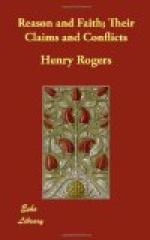____
This is easily said, and we know is often said, and loudly. But the justice with which it is said is another matter; for when we can get these cloudy objectors to put down, not their vague assertions of profound difficulties, uttered in the obscure language they love, but a precise statement of their objections, we find them either the very same with those which were quite as powerfully urged in the course of the deistical controversies of the last century (the case with far the greater part), or else such as are of similar character, and susceptible of similar answers. We say not that the answers were always satisfactory, nor are now inquiring whether any of them were so; we merely maintain that the objections in question are not the novelties they affect to be. We say this to obviate an advantage which the very vagueness of much modern opposition to Christianity would obtain, from the notion that some prodigious arguments have been discovered which the intellect of a Pascal or a Butler was not comprehensive enough to anticipate, and which no Clarke or Paley would have been logician enough to refute. We affirm, without hesitation, that when the new advocates of infidelity descend from their airy elevation, and state their objections in intelligible terms, they are found, for the most part, what we have represented them. When we read many of the speculations of German infidelity, we seem to be re-perusing many of our own authors of the last century. It is as if our neighbours had imported our manufactures; and, after re-packing them, in new forms and with some additions, had re-shipped and sent them back to us as new commodities. Hardly an instance of discrepancy is mentioned in the ‘Wolfenbutted Fragments,’ which will not be found in the pages of our own deists a century ago; and, as already hinted, of Dr. Strauss’s elaborate strictures, the vast majority will be found in the same sources. In fact, though far from thinking it to our national credit, none but those who will dive a little deeper than most do into a happily forgotten portion of our literature, (which made noise enough in its day, and created very superfluous terrors for the fate of Christianity,) can have any idea of the extent to which the modern forms of unbelief in Germany—so far as founded on any positive grounds, whether of reason or of criticism,—are indebted to our English Deists. Tholuck, however, and others of his countrymen, seem thoroughly aware of it.
The objections to the truth of Christianity are directed either against the evidence itself; or that which it substantiates. Against the latter, as Bishop Butler says, unless the objections be truly such as prove contradictions in it, they are ‘perfectly frivolous;’ since we cannot be competent judges either as to what it is worthy of the Supreme Mind to reveal, or how far a portion of an imperfectly-developed system may harmonise with the whole; and, perhaps, on many points, we never can be competent judges,




